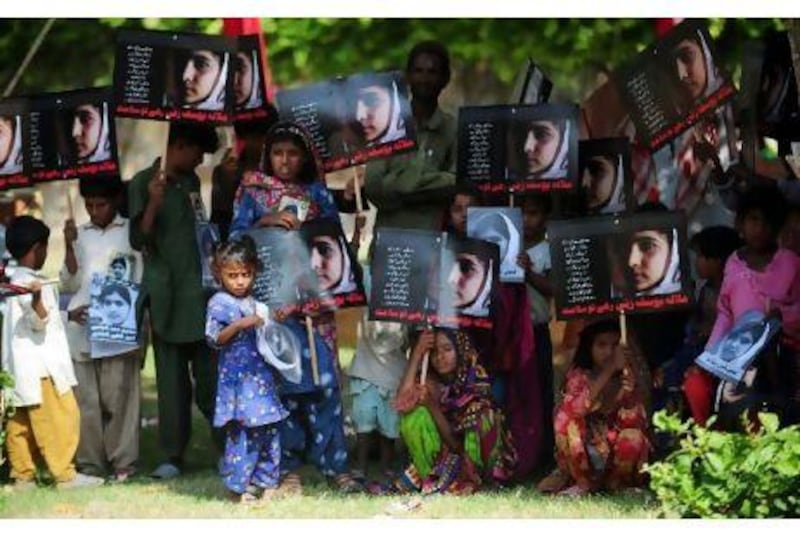Zia Ur Rehman
MINGORA, PAKISTAN // When militants allied to the Pakistani Taliban fired a bullet into the head of a 15-year-old schoolgirl last month, it blew apart government claims that the Pakistani military had returned Swat Valley to the peaceful beauty spot for which the area was once famous.
The Pakistani military drove the Taliban out of the region in July 2009 to end their brutal rule there during which they bombed girls' schools and carried out public executions. But the attack on Malala Yousufzai, a teenage activist for female education, underscored the threat still posed by militants in Pakistan's north-west region.
Yesterday, the United Nations honoured her with "Malala Day", highlighting her struggle for girls' education. She is recovering from her injuries at a hospital in Birmingham, England.
While the shooting of Malala in the town of Mingora was a story that resonated around the world, it was not an isolated case.
Militants loyal to Maulana Fazlullah, also known as the "Radio Mullah", the leader of a banned Pakistani militant group, have carried out several attacks of this nature in recent months, according to tribal leaders and politicians.
"Political elders and leaders of anti-Taliban peace committees of Swat are key targets of the Taliban because they condemned the atrocities of the Taliban during their reign, and assisted law enforcement agencies in the operation against the militants," said Saifullah Khan, a leader of Nekpikhel Qaumi Jirga, an anti-Taliban volunteer force in the Kabal area of Swat.
The most recent alleged Taliban assassination attempt came on November 1 when a Mingora peace committee member was injured. Two Charbagh peace committee members were killed in separate incidents just a week earlier.
Afzal Khan Damghar, a prominent political leader, was also shot dead on July 12 by an unidentified gunman. The violence has done great damage to Swat's reputation as the Switzerland of Asia as its picturesque landscape has been the scene of brutality, especially with the rise of the Taliban in 2008 and 2009.
During this time, militants killed about 1,200 people, according to local media and tribal leaders, while many more were kidnapped or expelled from their homes.
In response, the Pakistani government launched Operation Rah-e-Raast (Right Path) in April 2009.
The government claimed that the three-and-a-half-month campaign, which included air strikes and the use of special forces, drove the militants out of the valley by July 2009.
But the "Radio Mullah", said to be behind much of the destruction, evaded the Pakistani military. Security analysts now claim that Fazlullah and his key lieutenants fled to Afghanistan.
Politicians in Swat such as Sher Shah Khan, a member of parliament from Swat, say that the Taliban's power has been greatly diminished since 2009. "The Taliban are not in a position to regain control in Swat, and will restrict their battle to hit-and-run tactics - an ideal guerrilla warfare approach in the region's rugged terrain," he said.
However, Swat's Taliban spokesman, Sirajuddin, has warned that those who "take sides with the government ... will have to die at our hands".
"Other important people will be our target soon. As for the commoner, things remain normal," he told reporters on October 13 from an undisclosed location.
Although most Swati people believe that the Taliban will not be able to win control of the region, the threat of further attacks haunts many residents.
The militants claim that they still have the capacity to launch attacks from Afghanistan's Kunar and Nuristan provinces, where they are said to be hiding.
"Fazlullah is leading the attacks from Afghanistan's border provinces and is in touch with fighters in Malakand division," Sirajuddin said.
A Pakistani military commander, Ghulam Qamar, said that since February this year, there have been 17 major cross-border incursions where Pakistani Taliban fighters entered Pakistan from Afghanistan to attack Pakistani interests. Media reports suggest that Qari Zia Ur Rehman, a key commander of Al Qaeda who hails from Kunar, and Sheikh Dost Muhammad, a Nuristan-based local Afghan Taliban leader, are hosting and helping the Pakistani militants in Afghanistan's border areas. Mr Rehman is believed to have been once a close confidante of the late Al Qaeda chief, Osama bin Laden, and hosted him once after his escape from the Tora Bora mountains in 2001.
According to media reports, Pakistan has shared information with Afghanistan on the issue of Fazalullah's alleged involvement in the attack on Malala. Pakistan has requested that Afghanistan hand over Fazlullah, claiming that he was involved in planning major attacks in the country from across the border.





